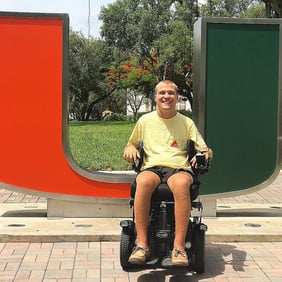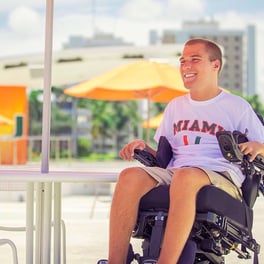College During the Coronavirus - Reeve Foundation
My name is Ian Malesiewski and I am currently finishing up my sophomore year at the University of Miami. Unfortunately, four years ago I broke my neck while wrestling at the Cadet World Team Trials and I am a C-4 quadriplegic. Although this injury left me paralyzed from the chest down, it has made me truly appreciate my education and life outside of athletics. With that being said, I am currently majoring in neuroscience with minors in chemistry, public health, and philosophy.
Luckily, I have a great support system that helps me succeed at school. However, it has been extremely challenging trying to safely navigate my way through the COVID-19 pandemic. Specifically, it has been very difficult, I haven’t left my house in almost 7 weeks. Although some might find it fun to just relax, I have not been able to go to physical therapy which causes a long list of problems for someone with a spinal cord injury. I try my best to stay active by using the exercise equipment I have at home, but nothing can quite match a true workout at a physical therapy gym.
Another issue caused by COVID-19, and probably the most important, is my nursing care. At school, I have night nurses that help me prepare for the day. Since the coronavirus is transmitted so easily, I put them on hold a while back. Although I am extremely healthy for the most part, I was a little nervous about not knowing who or what my nurses were coming in contact with in their daily lives. With that being said, I felt it was safer to periodically suspend my nursing.
With my nursing services on hold, it left 100% of the caretaking responsibilities up to my mom. She was working 24/7. All-day and all night. Luckily, my brother, who is also a college student at Kent State University, was able to come down to Miami to help us get through this difficult time. His classes were also moved online so it gave him the freedom and availability to help.
Regarding my schoolwork, I was at first a little nervous about transitioning completely online for my classes. So many thoughts were running through my head. Would I get lost in the shuffle? How would the online tests work with my disability? Would my professors remember my accommodations? Instead of stressing about it, I decided to reach out to the Office of Disability Services to create a game plan. If I have learned anything throughout my college experience, it is that I have to be an advocate for myself. Luckily, all of my professors were extremely accommodating, and we figured out a way to succeed in the new online format.
Although online classes are difficult, they have surprisingly brought many positive things to my academic experience. What I’ve found is that moving the classes to an online format has somewhat leveled the playing field. Being the only student on campus in a motorized wheelchair, I stick out. It isn’t easy asking for help in my classes or even asking for the simplest thing, like help opening a door. However, now that all of my classes are online, I feel more included and less of an outcast. I now feel like my classmates look past my wheelchair/disability and embrace me for who I truly am.
Although going to college is difficult for individuals with a spinal cord injury, it is still possible. This pandemic has shown me that the SCI community can thrive even in the most uncertain of times!
You can follow me on Instagram @ianmalesiewski34 and Twitter @fiercekitty3. You can also message me on Reeve Connect, Ian Malesiewski.
For more resources on the coronavirus, visit the Reeve Foundation COVID-19 Information Center.
Join Our Movement
What started as an idea has become a national movement. With your support, we can influence policy and inspire lasting change.
Become an Advocate